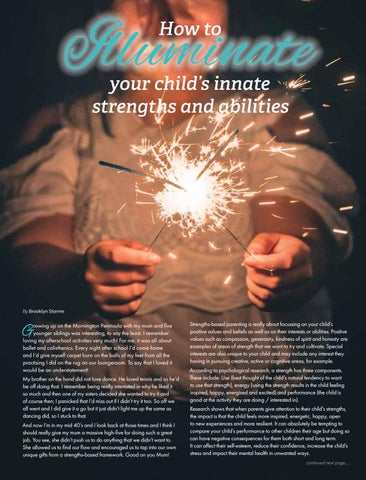Illuminate How to
your child’s innate strengths and abilities
By Brooklyn Storme
G
rowing up on the Mornington Peninsula with my mum and five younger siblings was interesting, to say the least. I remember loving my afterschool activities very much! For me, it was all about ballet and calisthenics. Every night after school I’d come home and I’d give myself carpet burn on the balls of my feet from all the practising I did on the rug on our loungeroom. To say that I loved it would be an understatement!
My brother on the hand did not love dance. He loved tennis and so he’d be off doing that. I remember being really interested in why he liked it so much and then one of my sisters decided she wanted to try it and of course then; I panicked that I’d miss out if I didn’t try it too. So off we all went and I did give it a go but it just didn’t light me up the same as dancing did, so I stuck to that. And now I’m in my mid 40’s and I look back at those times and I think I should really give my mum a massive high-five for doing such a great job. You see, she didn’t push us to do anything that we didn’t want to. She allowed us to find our flow and encouraged us to tap into our own unique gifts from a strengths-based framework. Good on you Mum!
Strengths-based parenting is really about focussing on your child’s positive values and beliefs as well as on their interests or abilities. Positive values such as compassion, generosity, kindness of spirit and honesty are examples of areas of strength that we want to try and cultivate. Special interests are also unique to your child and may include any interest they having in pursuing creative, active or cognitive areas, for example. According to psychological research, a strength has three components. These include: Use (best thought of the child’s natural tendency to want to use that strength), energy (using the strength results in the child feeling inspired, happy, energised and excited) and performance (the child is good at the activity they are doing / interested in). Research shows that when parents give attention to their child’s strengths, the impact is that the child feels more inspired, energetic, happy, open to new experiences and more resilient. It can absolutely be tempting to compare your child’s performance to other children their age but doing so can have negative consequences for them both short and long term. It can affect their self-esteem, reduce their confidence, increase the child’s stress and impact their mental health in unwanted ways. continued next page..... www.peninsulakids.com.au 47
